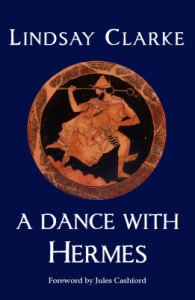Gods are forces with which we as mortal humans eternally engage. This is the fundamental insight writer Lindsay Clarke explores in his new collection of poems:
“Where is the habitation of the gods
if not in us? And where are we if not
inside the mysteries they perpetrate
about us and around?”
And in particular, as the title tells us, these poems are about the multi-faceted, shifting forces embodied by the winged god Hermes - messenger god of thresholds and trade, guide of travelers and of the newly dead, part unreliable trickster, part helpful companion. In addition to these attributes and roles, Hermes holds the Caduceus, entwined with two snakes, which is associated with healing and, as precursor to the magic wand, with the transformative powers of the imagination. Hermes, inventor of the lyre, also represents music and poetry. And in his many guises, moods and roles Hermes represents the spontaneous dance of our creative potential.
In addition to a foreword by Jules Cashford (translator of The Homeric Hymns for Penguin), there is a helpful introduction by Clarke, in which he lays out a condensed
yet clear overview of the evolution of Hermes from primitive times to his appearance in the Homeric Hymn to Hermes around the 7th century BC, through to the western Hermetic tradition, an influence vital to the Renaissance and its alchemical underpinning.
Clarke also recounts how, inspired by his friend John Moat’s “life lived in service to the Imagination” which Moat equated with the figure of Hermes, Clarke wrote a poem for his friend called ‘Koinos Hermes”
“the sly
light-fingered god of crossways, transit,
emails and exchange, the wing-heeled, shifty
wheeler-dealing go-between, who’ll slip right
through your fingers if you try to pin
him down. For he is labile, street-wise
and trans-everything.”
This poem, which now begins the collection, catalyzed what Clarke modestly terms the “procession of poems, verses, squibs - call them what you like -” that comprise these 50 pages of poetry. The poem’s tone and its form of set the style for the poems that followed in a swift and easy way “almost by dictation”.
Clarke explains that not only in this collection’s content and form but also in the manner of its emergence the nature of the god is present and at work. The verses roll
along in carefree, sometimes careless ease of movement in which moments of literary buffoonery:
“What he loves
best is to astound the mind with such deceptive
art as brings about true transformation,
and it’s the virtue of his wand to wide-awaken
into lucid dreams of the Imagination
those who don’t yet see we are myth-taken.”
mingle with lines of soul touching lucidity:
“He oversees the drowsy and the comatose,
has heard the chimes at midnight and will
act as a prison visitor to those for whom
the lonely stretches before dawn become
the penitentiary of mind.”
And deft light-handed wisdom:
“For nothing speaks more truly than a dream,
and where else (asks Hermes), in the jangle
of a time so fast to change that even
wisdom seems redundant, shall we keep
those secrets that the soul discloses
for our welfare while we sleep?”
While the gods are alive, so are we, and while Hermes dances, no one can take over our imagination. Many thanks to Anthony Nanson of Awen for making this life-affirming collection available from one of our great lyric masters of language.

 RSS Feed
RSS Feed